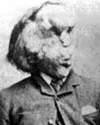 (source)
(source)
|
Joseph Merrick
(5 Aug 1862 - 11 Apr 1890)
English patient known as the “Elephant Man” because of severe facial disfiguration which also affected much of his body.
|
The Story of an Outcast
From The Speaker (London, 1890)
We can remember no invented tale that speaks so to the heart at once of the cruelty of life, and the beauty of human compassion, as the true story closed this week by a sentence in the newspapers, announcing that Joseph Merrick, the “Elephant Man,” was dead.
Imagine a human soul clothed in a body so unspeakably frightful that, seeing it, men turned sick with loathing, and women fainted; a being who had to be conveyed from place to place in secret; who hardly dared to venture abroad even by night; who, finding his fellow-creatures run from him, grew terrified by the terror he created, and shuddered in dark comers like a hunted beast. Imagine him driven by starvation to accept a showman’s offer and be exhibited to the most brutal of audiences, that commonly enough shrieked and ran pell-mell from the tent as soon as the curtain was drawn.
Early in 1886, Mr. Frederick Treves, one of the surgeons of the London Hospital, found Merrick in a penny show, in a room off the Whitechapel Road, crouching behind an old curtain and trying to warm himself over a brick that was heated by a gas-jet. Mr. Treves went up to him not only without fear or loathing, but with sympathy. For the first time in his life of twenty-four years Merrick heard a kind word and was spoken to like a man. The effect was curious. It made him afraid at first. He shrank as an ordinary man would from something uncanny. Then as he began to realise the truth, he broke into sobs of gratitude. Days and even weeks passed, however, before he recovered from the shock of hearing a compassionate word.
The police prohibited his show on the ground of public decency. So he went to Belgium, where again the police interfered, and where an agent decamped with his money. Merrick was left destitute and starving in the streets of a foreign town, where the ignorant mob thought him a fiend.
He came back to London—how, no one quite knows. At every station and landing-place crowds dogged him. Steamers refused to have him on board. But he came back to London because in London lived the only man who had ever given him a kind word. He made his way to the London Hospital, found Mr. Treves, who had him lodged for a time in an attic in the hospital, and determined to find a permanent shelter for him.
But now it was found that no institution would receive him. The Royal Hospital for Incurables and the British Home for Incurables alike declined to take him in unless sufficient funds were forthcoming to pay for his maintenance for life. He himself begged that he might be placed in a Blind Hospital. It is hard to match the pathos of this plea.
Then in November, 1886, Mr. Carr Coram, the chairman of the London Hospital, wrote to the Times, asking help for this case, and the British public responded. A room was built for Merrick on the ground floor in a remote wing of the hospital, and there, surrounded with books, flowers, and a hundred tokens of the kindness that is really quick in the public heart, he has lived until this last week.
He had found many friends—the Prince and Princess of Wales, Mr. Gladstone, Mrs. Kendall, and others. To Mrs. Kendall is due the happy suggestion that Merrick should be taken to see the Christmas Pantomime at Drury Lane. She engaged the Royal box; she had him brought to the theatre, and took every precaution that no strange eye should see him. Hidden from the house, behind the curtains of the box, the “Elephant Man” tasted an hour or two of intoxicating happiness. It was all real to him—the fairies, the splendour, and the jewels.
Merrick, in spite of his hideous exterior, and terrible experiences, was in his way a gentle sentimentalist, and gushed forth at times, under the happy conditions of his life at the hospital, in verse modelled on the hymns of Dr. Watts, in which he gave utterance to feelings of gratitude the sincerity of which none ever questioned. It was a tender heart that was beating beneath a mask more hideous than that of Orson. Above all, it was a heart that was filled with love for the man who was literally his saviour, who first spoke kindly to him, who rescued him from a fate a thousand times worse than death, and to the end was both his doctor and his friend. Recently it was only Mr. Treves who could thoroughly understand the poor creature’s maimed utterances; and to Mr. Treves he clung to the last with the wistful trust and affection of a dumb animal.
It is difficult to speak of this man’s case without emotion. But luckily it is harder still to hear of it and believe that the “struggle-for-lifers” have grasped the true secret of life, or even a half of it.
- 5 Aug - short biography, births, deaths and events on date of Merrick's birth.
- Obituary: Joseph Merrick - from the Medical Mirror (1890).
- The “Elephant Man” - from New York Medical Abstract (1886) - a summary of Dr. Treve’s medical description in the British Medical Journal.
- The True History of the Elephant Man, by Michael Howells. - book suggestion.
- Booklist for Joseph Merrick.




